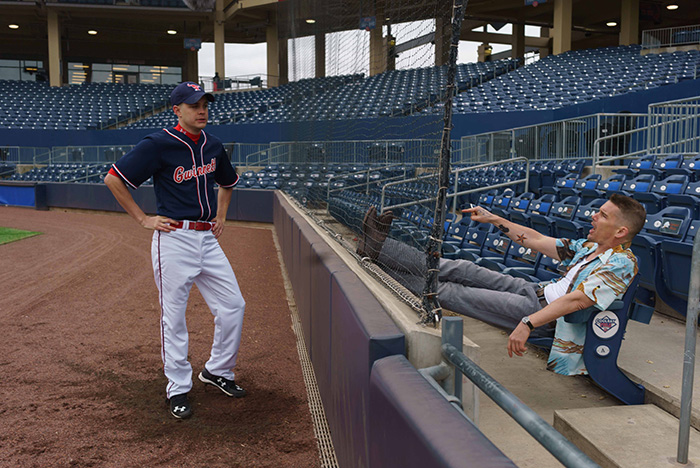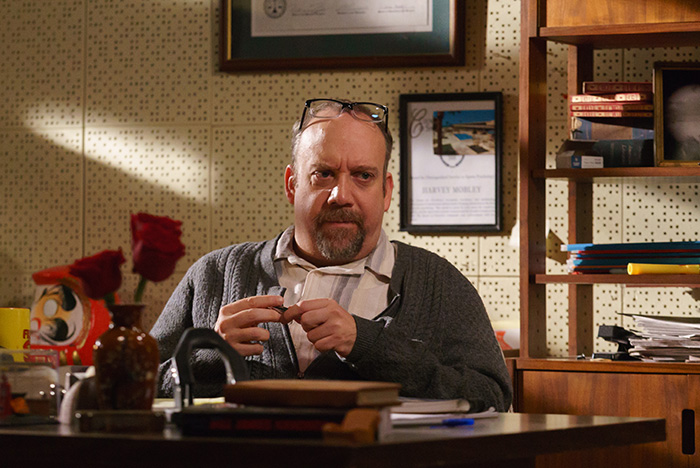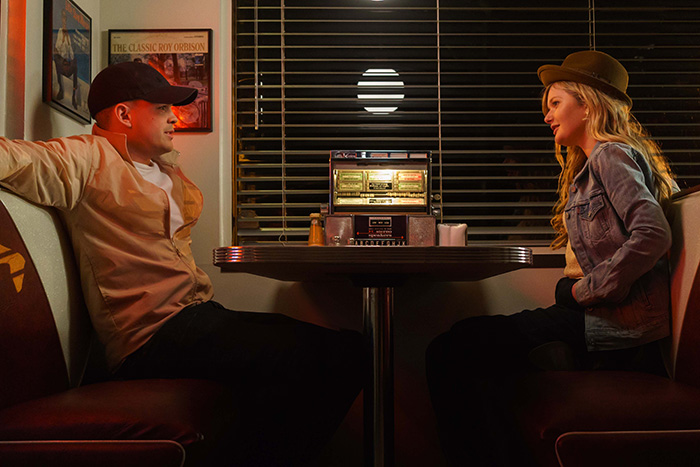I admittedly didn’t think too much on The Phenom after watching its trailer. There was a good cast, its look behind the curtain of fame seemed intriguing, and there’d probably be some darkly honest depictions of sports abuse at the hands of over-zealous parents. But then I saw who the writer/director was and suddenly all I could do was think. Noah Buschel is the man behind a wonderful little character piece from a few years back called Sparrows Dance and seeing his name as the creator of this baseball movie had me scratching my head. It looked run-of-the-mill: prodigy gets the “yips” and must face his past to overcome. It didn’t seem like something the author of Sparrows Dance would tackle. And to a point I was right.
The Phenom isn’t about baseball. Sure we see a few pitches — mostly the wild ones that derailed Hopper Gibson’s (Johnny Simmons) promising Big League career — but they are merely a means to an end as far as getting the boy to see “mental coach” psychiatrist Dr. Mobley (Paul Giamatti). This film is instead about a person so warped between two worlds that he isn’t sure which is real. Can he simultaneously be the regular kid he knows he is and the future Hall of Famer his dad (Ethan Hawke‘s Hopper Sr.) has groomed with fearsome ferocity? Or has his life become a dream like the passage from F. Scott Fitzgerald’s The Crack-Up read by Mobley early on? Reality exists inside Hopper’s head; the real world is his opponent.

What Bushel delivers are vignettes from past and present showing this fracture’s origins. It stems from his father’s list of rules when Hopper was only five — the first of which was never to show emotion on the mound with the second about understanding he never leaves said mound whether the game was over or not. But that’s only one aspect. This pressure via abuse was a constant he knew for years. Only when the fruits of his labor arrive is he also able to feel the pressures of life. Hopper truly loves the game and has devoted himself to it for that sole reason, but he’s lost the joy along the way. Applause has made way towards adoration, success to jealousy. Being a commodity, however, is hardly new.
Hopper is trapped in a self-imposed prison like the lead of Sparrows Dance (played by Marin Ireland who portrays a sports reporter here pulling no punches about the despair her own occupation provides). The films parallel each other very closely, an increase in budget for multiple sets and larger cast separating them. Both have a broken central character that isn’t necessarily searching for answers, but who receives them anyway. She finds compassion from a stranger, Hopper the memory of simplicity — a simplicity he may never have possessed. It seems he’s worked towards the majors since elementary school and as a result lost the chance for a childhood not revolving around Dad’s put-downs and extreme workouts. The dream doesn’t circle his love of baseball; it’s to finally be loved without it.

This is pretty much the psychology surrounding all sports-themed hang-ups. Rather than play for the love of the game you’re playing for a team, city, nation, and the money that follows. People who were in his shoes baseball-wise surround him: his father (who buckled and chose a path of crime) and high school coach (Yul Vazquez‘s Eddie whose career was cut short by injury). He is confronted by those with similar issues too: his girlfriend (Sophie Kennedy Clark‘s Dorothy, valedictorian and combatting the pressures of college and automaton parents) and the albatross of Howard Glass, a young pitcher Hopper’s MLB trajectory mirrors who ultimately committed suicide. He isn’t alone and yet he’s absolutely alone. He craves honesty, but can’t be honest with himself.
Buschel lets Hopper’s education into himself play out with artifice. He gives it an air of dream with close-ups of people emotionlessly describing truths he needs to hear, fluid time (Does Simmons still have a bruise on his forehead despite being two-years removed from when his father threw a beer can at it?), and weirdly detached vantage points. One scene has Hopper throwing pitches in the background while we listen to a grounds person humming and fixing a JUGS machine in the foreground. Another has a not-so-good-on-roller-skates waitress stumbling and blocking the characters in conversation behind her. The moments are just “off” enough to notice and glaring to know they’re intentional. After all, Buschel zoomed out so far in Sparrows Dance that he showed beyond the set’s edges.

This inventiveness, creativity, and complete disregard for mainstream sensibilities are what make the director so captivating. While he over-uses the split focus diopter here (maybe this is a personal preference, but I despise when there isn’t a vertical line to hide the effect and you get that blur in the middle), he also has fun with isolation techniques to showcase Hopper’s “island.” He’s doing things with seemingly generic subjects that give them life and complexity. And there’s merit to this whether you find yourself enjoying the final product or not because he’s at least making you think and interpret. The added bonus of great performances — Simmons, Giamatti, and Hawke each get their teary-eyed dramatic moment to shine — only enhances the journey by giving his concepts life.
Does Hopper overcome the “yips”? His father? You have to watch for yourself to discover if the film even decides whether answering those questions is relevant. In the grand scheme of things, Buschel isn’t interested in them. It’s not about Hopper prevailing over people or things, but his prevailing over himself and the guilt, regret, and insecurities miring his arduous evolution into an adult. Buschel constantly has his lead asking what certain words mean because while Hopper is engaged and interested in expanding his knowledge, life has yet to allow him the capacity to do so. The Phenom isn’t showcasing a prodigy inexplicably throwing away God-given talents. It depicts the result of a lost childhood and the emptiness success provides without an underlying identity to support its weight.
The Phenom hits limited release and VOD on Friday, June 24th.

